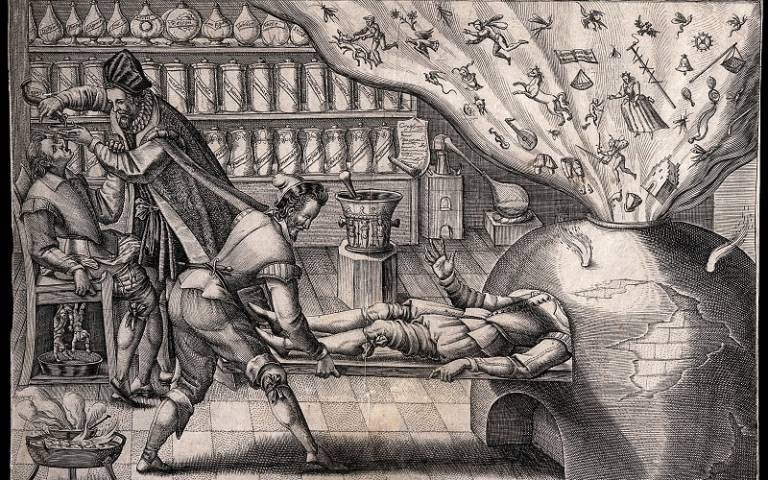HYBRID EME/IAS book launch: Early Modern Minds
19 October 2022, 5:00 pm–7:00 pm

Early Modern Exchanges and IAS are pleased to launch Prof Helen Hackett's new book, 'The Elizabethan Mind: Searching for the Self in an Age of Uncertainty' (Yale UP). With papers from Prof Raphael Lyne (Cambridge) and Prof Kate Hodgkin (UEL).
This event is free.
Event Information
Open to
- All
Availability
- Yes
Cost
- Free
Organiser
-
Early Modern Exchanges / Institute of Advanced Studies
Location
-
IAS Common GroundG11, ground floor, South WingUCL, Gower Street, LondonWC1E 6BTUnited Kingdom
Each speaker will give a short paper, followed by discussion and Q&A. Chaired by Shani Bans.
Then, during informal drinks, there will be an opportunity to buy (at a discount) a copy of Helen Hackett’s new book, The Elizabethan Mind: Searching for the Self in an Age of Uncertainty (Yale UP, https://yalebooks.co.uk/page/detail/?k=9780300207200).
This is a hybrid event, with both in-person attendance and online viewing possible: please select the appropriate ticket when registering: https://earlymodernminds.eventbrite.co.uk
Helen Hackett (UCL), ‘Man is but his mind’: what did the Elizabethans mean by this?
‘Man is but his mind’, a saying derived from Cicero, was repeated in a number of Elizabethan works. It may well have been popular because it sounds resonant and aphoristic but at the same time is enigmatic and vague. As such, it was used to convey diverse and even contradictory meanings. One example is an essay of 1593 by Thomas Churchyard which used the phrase as its title, and turned it to several purposes: to marvel at the alarming intensity of the powers of the mind; to taxonomise people into different social types; and to urge all English minds to merge their diversities and unite in the cause of patriotism. Veering between the personal and political, and between different models of mind-body relations, Churchyard’s essay formed part of a tide of late Elizabethan works which were fascinated by the mind but wrestled with competing intellectual frameworks for understanding it.
Kate Hodgkin (UEL), ‘Wandering? Worse: the wandering mind in the early modern world’
In this paper I revisit the idea of the wandering mind in relation to the wandering body, and attempt to contextualise it in international perspective through a consideration of internal and external wandering. Wandering as a signifier of madness is found across many times and cultures. In the early modern world, the humoral framework for the understanding of mental disorder was familiar across Europe and through the Ottoman and Mughal Empires, generating shared concepts and interpretations alongside significant differences in descriptions of the key signs of mental disorder. The paper will explore a constellation of ideas around madness and travel, with the psychological and physical dislocations involved in both, as well as the persistence of specific tropes of madness in different times and places.
Raphael Lyne (Murray Edwards College, Cambridge), Speaking and Thinking 'We' in Early Modern Drama
Individual minds often collaborate with others: how transformative is the experience of being a 'we' in action? Individuals also often speak for a 'we': what is conveyed, if anything, by that, beyond a projection or assumption that one point of view is shared by a group? There are varied answers to these questions, all works in progress, in 21st-century cognitive science and philosophy, and these will offer a framework for turning back to some distinctive, sharp-edged, and idiosyncratic versions of 'we' (in thought and speech) in early modern plays. In Ben Jonson's The Alchemist and Francis Beaumont's The Knight of the Burning Pestle questions about the mind and its permeability, the individual in society, and the company dynamics of the theatre, produce implicit hypotheses and interesting faultlines.
Image credit: A surgery where all fantasy and follies are purged and good qualities are prescribed. Line engraving by M. Greuter, c. 1600.. Credit: Wellcome Collection. Public Domain Mark
About the Speakers
Prof Helen Hackett
Professor of English Literature at UCL
Helen's books include Virgin Mother, Maiden Queen: Elizabeth I and the Cult of the Virgin Mary, Women and Romance Fiction in the English Renaissance, and Shakespeare and Elizabeth: The Meeting of Two Myths. She edited the essay collection Early Modern Exchanges: Dialogues Between Nations and Cultures, 1550-1750. Her latest book, The Elizabethan Mind (Yale UP, 2022) explores how the Elizabethans thought about the mind, and how these ideas informed their literature and culture.
More about Prof Helen HackettProf Kate Hodgkin
Professor of Cultural History and UEL Director of the Raphael Samuel History Centre at University of East London
Kate Hodgkin is professor of cultural history and research director in the School of Arts and Cultural Industries, University of East London. Her research focuses on the culture of early modern England, with particular interests in madness, melancholy, memory and subjectivity. Her publications include Madness in Seventeenth-Century Autobiography and Women, Madness and Sin in Early Modern England: the autobiographical writings of Dionys Fitzherbert. She is currently editing the early modern volume of the Bloomsbury Cultural History of Madness.
More about Prof Kate HodgkinProf Raphael Lyne
Professor of Renaissance Literature at Murray Edwards College, Cambridge
Raphael Lyne is a Professor of Renaissance Literature at the University of Cambridge, and a Fellow of Murray Edwards College. He is the author of four books, most recently Memory and Intertextuality in Renaissance Literature, and (with Cathy Shrank) the co-editor of Shakespeare's Poems for Routledge.
More about Prof Raphael Lyne Close
Close

